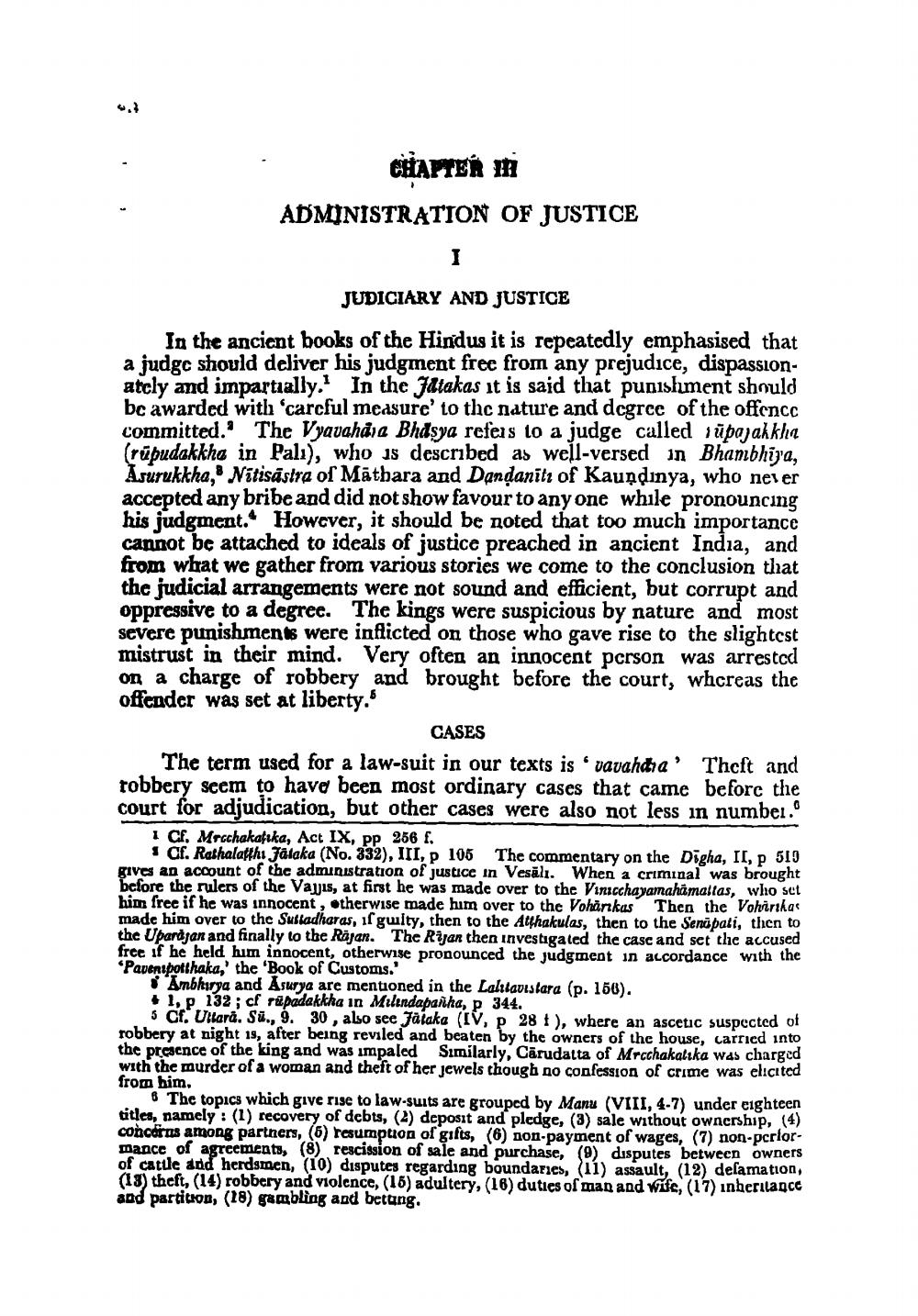________________
CHAPTER M ADMINISTRATION OF JUSTICE
JUDICIARY AND JUSTICE In the ancient books of the Hindus it is repeatedly emphasised that a judge should deliver his judgment free from any prejudice, dispassionately and impartially. In the Jatakas it is said that punishment should bc awarded with carcful measure to the nature and degree of the offence committed. The Vyavahdia Bhasya refers to a judge called üpajakkha (rūbudakkha in Palı), who is described as well-versed in Bhambhiya, Asurukkha, Nitisastra of Māthara and Dandaniti of Kauņdinya, who never accepted any bribe and did not show favour to any one while pronouncing his judgment. However, it should be noted that too much importance cannot be attached to ideals of justice preached in ancient India, and from what we gather from various stories we come to the conclusion that the judicial arrangements were not sound and efficient, but corrupt and oppressive to a degree. The kings were suspicious by nature and most severe punishments were inflicted on those who gave rise to the slightest mistrust in their mind. Very often an innocent person was arrested on a charge of robbery and brought before the court, whereas the offender was set at liberty.
CASES The term used for a law-suit in our texts is 'vavahdra' Theft and robbery seem to have been most ordinary cases that came before the court for adjudication, but other cases were also not less in number.
i C, Macchakafika, Act IX, pp 256 f.
1 Cf. Rathalafthi Jataka (No. 332), III, p 105 The commentary on the Digha, II, p 519 gives an account of the administration of justice in Vesālı. When a criminal was brought before the rulers of the Vajjis, at first he was made over to the Vinicchayamahämallas, who set him free if he was innocent, otherwise made him over to the Vohankas Then the Vohirikas made him over to the Sulladharas, if guilty, then to the Atthakulas, then to the Senopati, then to the Ubardjan and finally to the Rajan. The Rijan then investigated the case and set the accused free if he held him innocent, otherwise pronounced the judgment in accordance with the 'Pavenspotthaka,' the 'Book of Customs.'
Ambkırya and Asurya are mentioned in the Lalitavistara (p. 150). +1, p 132 ; cf rapadakkha in Milındapanha, p 344.
s cf. Ullara. Si., 9. 30, also see Faiaka (IV, p 28 1 ), where an ascetic suspected of robbery at night 19, after being reviled and beaten by the owners of the house, carried into the presence of the king and was impaled Similarly, Cärudalta of Mrcchakalika was charged with the murder of a woman and theft of her jewels though no confession of crime was elicited from him, ... The topics which give rise to law-suits are grouped by Manu (VIII, 4-7) under eighteen titles, namely: (1) recovery of debts, (2) deposit and pledge, (3) sale without ownership, (4) concoins among partners, (5) resumption of gifts, (6) non-payment of wages, (7) non-periormance of agreements, (8) rescission of sale and purchase, (9) disputes between owners of cattle and herdsmen, (10) disputes regarding boundaries, (11) assault, (12) delamation, (13) theft, (14) robbery and violence, (16) adultery, (16) duties of man and wife, (17) inherilance and particion, (18) gambling and betong.




